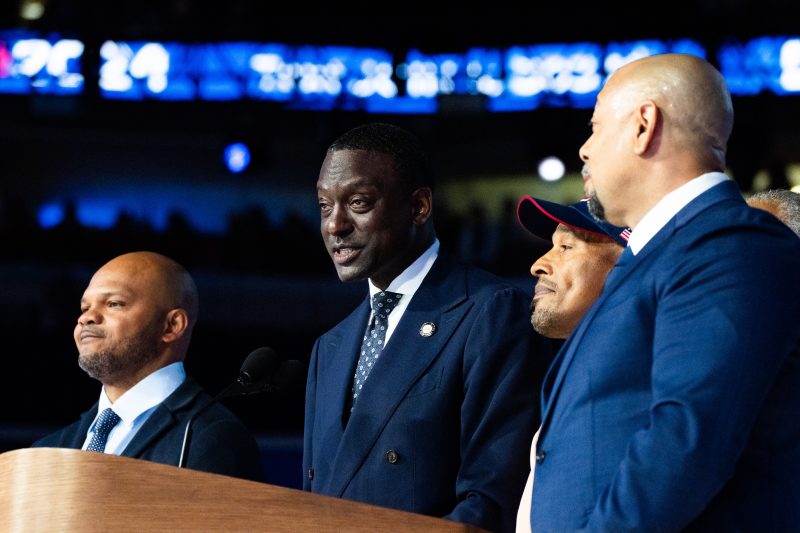A group of men who were exonerated for the rape and assault of a woman in Central Park in 1989 have sued Donald Trump for continuing to suggest that they are guilty, including at the presidential debate in Philadelphia last month.
The Central Park Five alleged in a federal court defamation lawsuit filed in Pennsylvania that Trump falsely claimed during his debate against Vice President Kamala Harris that the men pleaded guilty after being charged in the case as teenagers, and that they had killed someone. The defendants in fact were cleared of wrongdoing. And the victim of the infamous attack sustained life-threatening injuries but survived.
At the time of the crime, Trump took out a full-page newspaper ad calling for a return of the death penalty in New York, a move widely seen as a reaction to the attack on the jogger, directed at those who had committed the assault.
After a re-investigation of the case and after another suspect’s DNA confirmed his involvement, the defendants, who were Black and Latino, were cleared of wrongdoing. By then, they had served years in prison.
As he seeks a second term in the White House as the Republican nominee in the Nov. 5 election, Trump has continued to make public statements implying guilt on the part of the Central Park Five, suggesting that they were responsible for some crimes that occurred in the park — including another brutal assault.
Trump’s comments at the debate reached an enormous television audience and were further amplified in widespread news coverage.
The wrongly accused men “suffered harm, including severe emotional distress and reputational damage, as a direct result of Defendant Trump’s false and defamatory statements at the [debate], as well as his continuing pattern of extreme and outrageous conduct,” their lawyers wrote in the lawsuit.
Trump lost two defamation lawsuits over the past two years that were brought against him by author E. Jean Carroll, who also successfully sued him for a long-ago sexual assault.
Carroll, who won verdicts totaling about $90 million, said Trump sexually assaulted her in the mid-1990s. He adamantly denied it and repeatedly called her a liar and insulted her after her claim was made public.
Trump spokesman Steven Cheung said in a statement Monday that the lawsuit was an attempt to interrupt the election, a refrain Trump and his supporters have used in response to other civil and criminal cases against him.
“This is just another frivolous, Election Interference lawsuit, filed by desperate left-wing activists, in an attempt to distract the American people from Kamala Harris’s dangerously liberal agenda and failing campaign,” Cheung wrote in the statement.
New York City reached a settlement with the Central Park Five for $41 million to compensate them for what was determined to be their wrongful prosecution and imprisonment.
One member of the group, Yusef Salaam, is now a member of the New York City Council representing sections of Harlem.
The new lawsuit stems from Trump’s comments at the debate, which was watched by 67 million people on Sept. 10, according to court papers.
In a portion of the debate focused on race and politics, Harris, the Democratic nominee, said she wanted to remind voters that Trump had taken out the newspaper ad suggesting the perpetrators of the jogger attack should face the death penalty.
“We have someone who wants to be president who has consistently over the course of his career attempted to use race to divide the American people,” Harris said.
Trump issued a muddled response, first suggesting that the teens pleaded guilty before he seemingly backtracked.
“They admitted — they said, they pled guilty. And I said, well, if they pled guilty they badly hurt a person, killed a person ultimately,” Trump said. “And if they pled guilty — then they pled we’re not guilty.”
The lawsuit also lays out an encounter between Trump and Salaam after the debate. Salaam introduced himself to Trump as attendees asked Trump if he would apologize to the five men for his comments.
“Ah, you’re on my side then,” Trump said to Salaam, who corrected the former president, saying he was not a supporter. Trump then waved and walked away.
“Plaintiff Salaam was attempting to politely dialogue with Defendant Trump about the false and defamatory statements that Defendant Trump had made about Plaintiffs less than an hour earlier, but Defendant Trump refused to engage with him in dialogue,” the lawsuit says.
To prove defamation, the group will have to show that Trump’s public comments were false and caused them harm. The plaintiffs are seeking monetary damages for reputation harm, emotional distress and out-of-pocket expenses as well as punitive damages to prevent Trump from continuing to repeat his claims about them.

